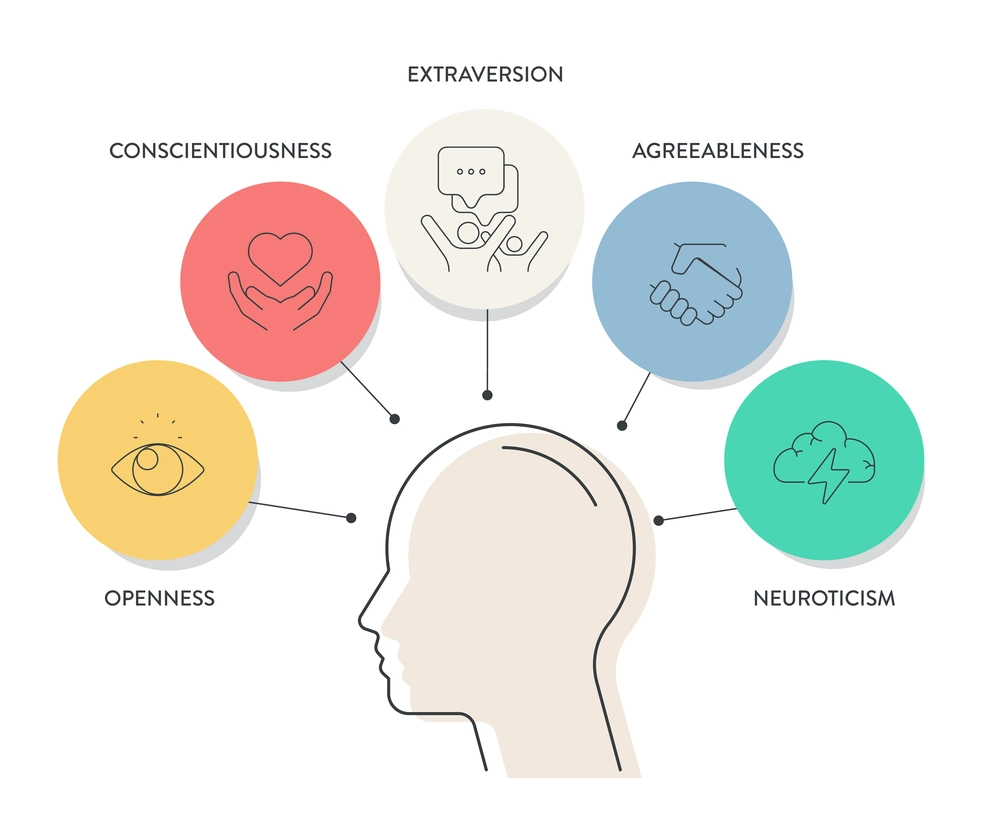Psychological Personality Test
A psychological personality test is much more than just a series of questions. It is a sophisticated scientific tool developed by experts in the field of psychology, combining theoretical knowledge with advanced empirical research. At LogiPass, we are proud to offer research-based personality tests that were developed in close collaboration with our professional and experienced team of psychologists.
Our goal is not just to provide you with results, but to ensure that these results are reliable, accurate, and have practical value for your lives. Each question in the test has undergone a rigorous process of development and validation to ensure that it indeed measures what it is supposed to measure.
Our tests are based on leading psychological models and up-to-date research in the field of personality psychology. For example, the Big Five model, which is considered one of the most comprehensive and reliable models for understanding personality.

The Big Five Personality Traits Model
The Big Five Factors Model, also known as the Big Five, is one of the leading and most widely accepted models in personality psychology. It divides personality into five main dimensions:
| 1 | Extraversion: Measures the degree of energy a person draws from social interactions versus time alone. People with a high score in this dimension tend to be sociable, assertive, and energetic. |
| 2 | Agreeableness: Examines the tendency for cooperation and empathy towards others. People with a high score in this dimension tend to be polite, empathetic, and cooperative. |
| 3 | Conscientiousness: Assesses the level of organization, responsibility, and achievement motivation. People with a high score in this dimension tend to be organized, responsible, and goal-oriented. |
| 4 | Emotional stability (as opposed to neuroticism) (Emotional Stability vs. Neuroticism): Examines the ability to cope with stress and negative emotions. People with high scores in emotional stability tend to be calmer and more confident. |
| 5 | Openness to Experience: Measures the degree of curiosity and willingness to try new things. People with a high score in this dimension tend to be creative, curious, and open to new ideas. |
The results you will receive from a questionnaire based on this model will reflect your unique personality profile across these five dimensions. They will provide a comprehensive picture of your strengths, challenges you may face, and potential areas for personal growth. It's important to emphasize that there are no 'good' or 'bad' results - each personality profile is unique and valuable.
Additionally, we have other personality questionnaires based on extensive research and development with newer theories for understanding the motivations and styles that drive us, and the personality barriers that limit us. For example, a questionnaire called 'Dominant Trait' which has a significant advantage in test length. The questionnaire is based on Shirzad Chamine's Positive Intelligence theory.

Advantages of LogiPass Personality Tests
LogiPass personality tests offer a wide range of benefits:
Personality tests offer a unique opportunity to deepen our self-understanding. They provide an in-depth look at traits and tendencies in our personality that are often hidden from us in everyday life. Through targeted questions, the tests allow us to examine ourselves from a new angle through an external eye.
One of the significant advantages of personality tests is their ability to provide insights into our thinking patterns and behaviors. They help us understand what motivates us and which values guide our decisions. This knowledge can be highly valuable in all areas of life, from personal relationships to personal development.
Personality tests also help identify strengths and weaknesses. They highlight traits we may not have been aware of before, and provide an opportunity to nurture and develop positive aspects of our personality. At the same time, they help us identify areas where we can try to improve and grow.
A deeper understanding of our personality can lead to developing more effective strategies for dealing with occupational challenges, and thus lead to a better balance in life and improvement in overall mental well-being.
Finally, personality tests can contribute to strengthening self-confidence. The better we understand ourselves, the greater our ability to appreciate our uniqueness. Recognizing our positive traits, along with accepting the complexities in our personality, can lead to a sense of wholeness and increased self-confidence.
